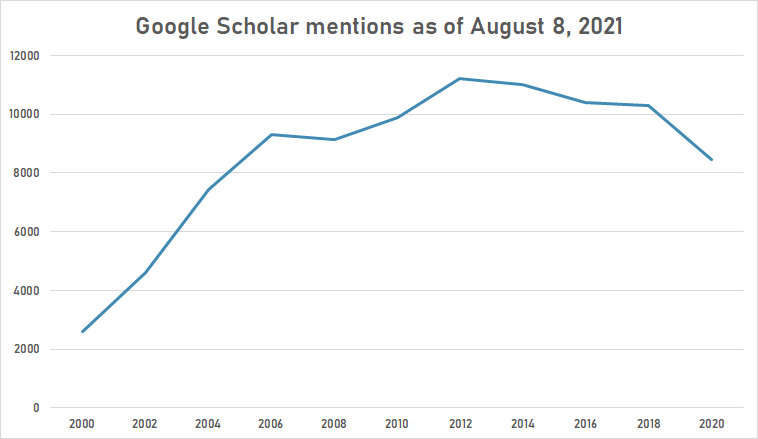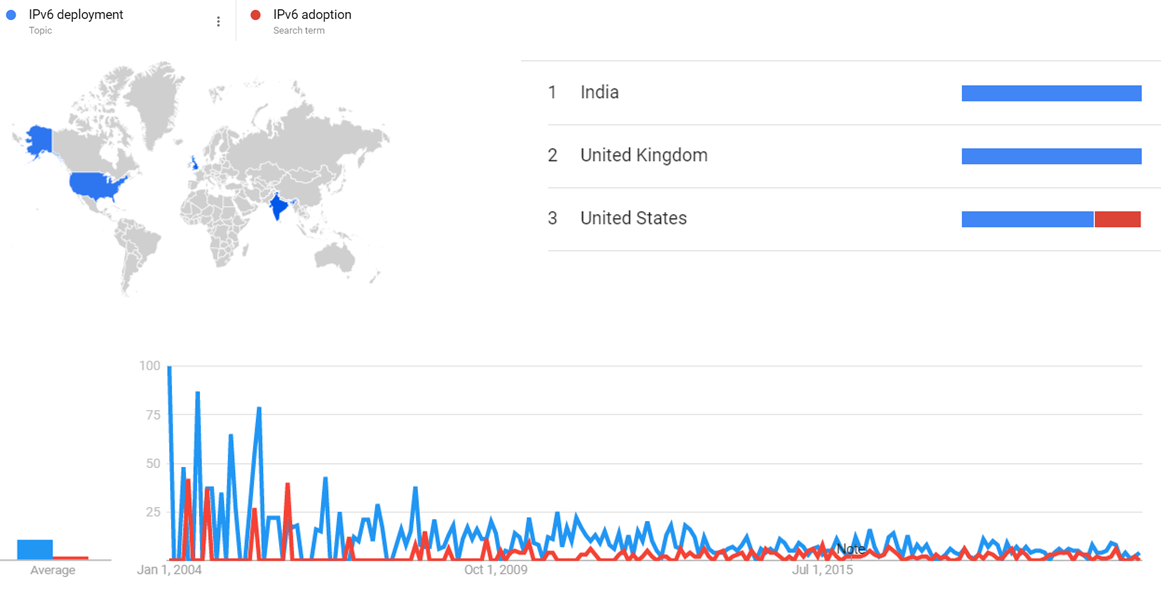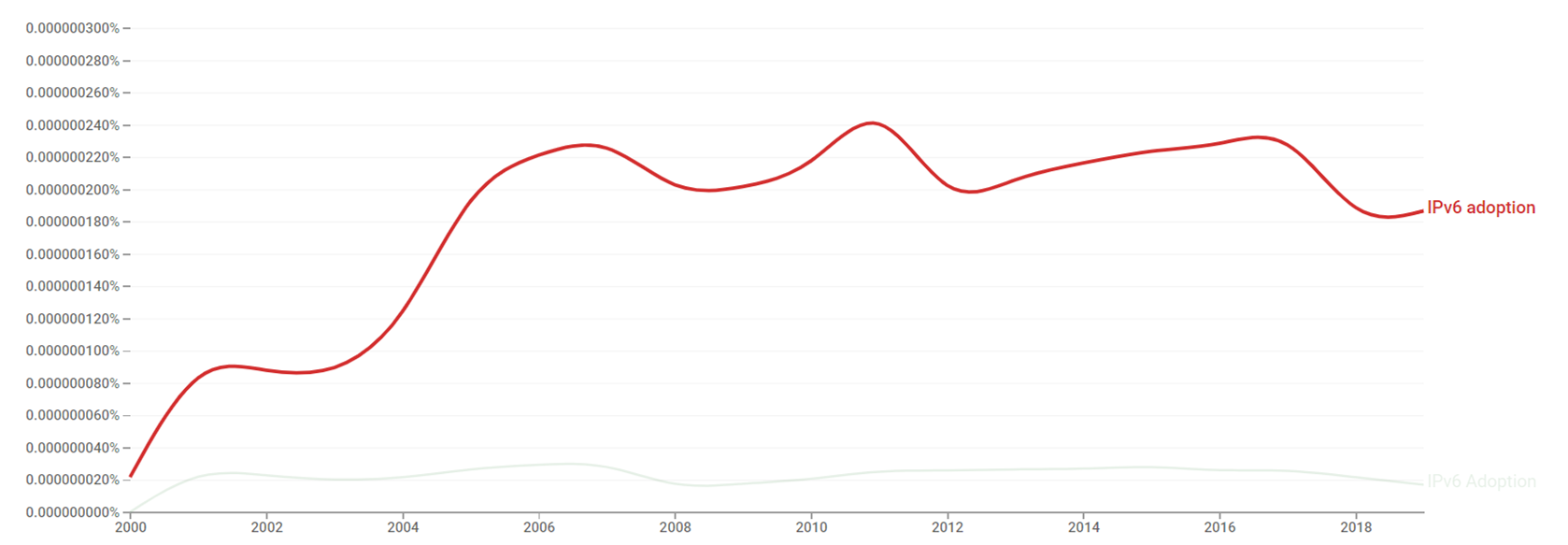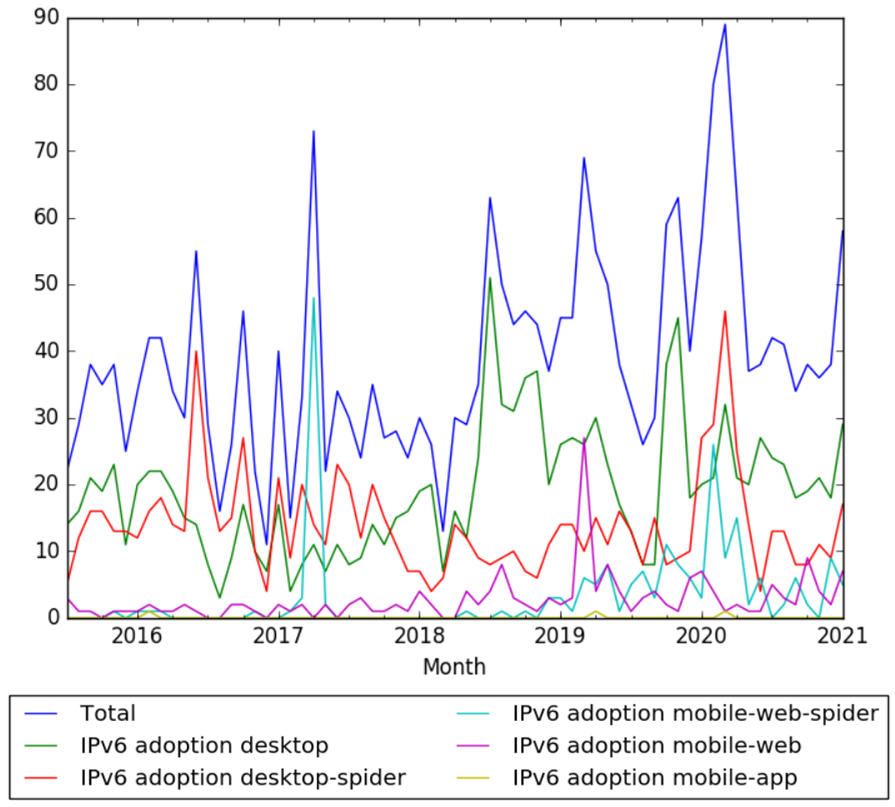Timeline of IPv6 adoption
Jump to navigation
Jump to search
Numerical and visual data
Google Scholar
The following table summarizes per-year mentions on Google Scholar as of August 8, 2021.
| Year | IPv6 |
|---|---|
| 2000 | 2,600 |
| 2002 | 4,620 |
| 2004 | 7,450 |
| 2006 | 9,300 |
| 2008 | 9,130 |
| 2010 | 9,880 |
| 2012 | 11,200 |
| 2014 | 11,000 |
| 2016 | 10,400 |
| 2018 | 10,300 |
| 2020 | 8,470 |

Google Trends
The comparative chart below shows Google Trends data for IPv6 deployment (Topic) and IPv6 adoption (Search Term) from January 2004 to February 2021, when the screenshot was taken. Interest is also ranked by country and displayed on world map.[1]

Google Ngram Viewer
The chart below shows Google Ngram Viewer data for IPv6 adoption from 2000 to 2019. [2]

Wikipedia Views
The chart below shows pageviews of the English Wikipedia article IPv6 adoption on desktop, on mobile-web, desktop-spider,mobile-web-spider and mobile app, from July 2015; to January 2021.[3]

Full timeline
| Year | Month and date (if available) | Entity type | Entity name | Stage | Details |
|---|---|---|---|---|---|
| 1993 | September | Standard | IPv6 | Project/working group creation | The Internet Engineering Task Force (IETF) creates a temporary, ad-hoc IP Next Generation (IPng) working group, led by Allison Mankin and Scott Bradner.[4] |
| 1995 | January | Standard | IPv6 | Recommendations | The IPng working group produces its list of recommendations for the IP next generation protocol, published as RFC 1752.[4] |
| 1996 | November | Operating system | Linux | IPv6 experimental | The first network code related to IPv6 is introduced in the Linux kernel 2.1.8 by Pedro Roque, based on the BSD API.[5][6][7] |
| 1998 | Project/working group creation | The KAME project starts as a subproject of the WIDE Project. It is a joint effort of six organizations in Japan which aimed to provide a free IPv6 and IPsec (for both IPv4 and IPv6) protocol stack implementation for variants of the BSD Unix computer operating-system. The project would conclude in March 2006.[8] | |||
| 1998 | December | Standard | IPv6 standard | Protocol draft | The draft IPv6 protocol standard is published by the Internet Engineering Task Force (IETF) as RFC 2460.[9] |
| 2000 | October | Operating system | Linux | Project/working group creation | The USAGI project is created to improve the quality and production-readiness of the Linux IPv6 stack. |
| 2003 | May 3 | Statistics | Cisco 6lab IPv6 statistics | Statistics start | Cisco's 6lab has data on IPv6 prefixes by country starting around this time.[10] |
| 2005 | June 18 | Operation system | Linux | IPv6 full support | Linux kernel 2.6.12 is released, with the "experimental" label dropped on its level of IPv6 support.[11][6][12][7] |
| 2007 | October | Statistics | Eggert's IPv6 statistics | Statistics start | Lars Eggert's statistics on the percentage of websites with IPv6 support had data going back to this time.[13] |
| 2008 | May 13 | Website | IPv6 experimental | Google announces that an IPv6 version of its search website is available at ipv6.google.com.[14] | |
| 2008 | September 4 | Statistics | Google IPv6 statistics | Statistics start | Google's IPv6 statistics are available starting this date.[15] |
| 2010 | February 5 | Website | YouTube | IPv6 active | Video hosting website YouTube confirms that it now supports IPv6.[16][17] This had been noticed by commentators on February 1, before the confirmation.[18] |
| 2011 | January 11 | ISP | Comcast | IPv6 access support | Internet Service Provider (ISP) Comcast activates its first 25 IPv6-enabled users in the Littleton, Colorado area using Apple computers. Comcast uses a Native Dual Stack configuration that supports both IPv4 and IPv6, using DOCSIS 3.0.[19][20] |
| 2011 | April | RFC 6146, describing the NAT64 standard, and RFC 6147, describing the DNS64 standard, are published.[21][22] | |||
| 2011 | May 3 | Hosting service | Linode | IPv6 hosting support | Server hosting service Linode begins offering native IPv6 support.[23] |
| 2011 | May 24 | Hosting service | Amazon Web Services | IPv6 hosting support | Amazon Web Services offers IPv6 support for its Elastic Load Balancers (ELBs) in US East and Ireland. All load balancers in these regions have publicly routable IPv6 addresses in addition to their IPv4 addresses.[24] |
| 2011 | June 8 | World IPv6 Day happens. On this day, major websites, including Google services, Facebook, Yahoo, and Bing, activate IPv6. The vast majority of devices are expected to be unaffected: they will either use IPv6 or fallback to IPv4.[25] The day is deemed successful.[26] See World IPv6 Day and World IPv6 Launch Day for more. | |||
| 2012 | April 24 | IPv6 is available over APN for the entire T-Mobile US network.[27][28] This follows an update in January that T-Mobile is testing IPv6 on select devices.[29] T-Mobile's transition would be the subject of a later case study.[30] | |||
| 2012 | May 4 | Statistics | Cisco 6lab IPv6 statistics | Statistics start | Cisco 6lab statistics on web content with IPv6 support start around this time.[31] |
| 2012 | June 6 | World IPv6 launch occurs. This is a permanent version of the IPv6 launch that occurred on the previous World IPv6 Day in 2011, instead of the 24-hour version used that day.[32] See World IPv6 Day and World IPv6 Launch Day for more. | |||
| 2014 | June 17 | Hosting service | DigitalOcean | IPv6 hosting support | Server hosting service DigitalOcean begins offering native IPv6 support.[33][34] |
| 2014 | July 22 | Comcast reports that 100% of its broadband mobile network now supports IPv6.[35] | |||
| 2016 | August | Facebook reports that over 50% of its traffic from the four major U.S. mobile networks is now over IPv6. Similarly, Akamai reports that over 50% of requests to dual-stacked sites on Akamai from the four major U.S. mobile networks is now over IPv6.[36] | |||
| 2017 | January 25 | Hosting service | Amazon Web Services | IPv6 hosting support | Amazon Web Services begins offering IPv6 support for EC2 instances in virtual private clouds (VPCs) in 15 regions, and Application Load Balancers in 9 regions.[37] An initial announcement around this appears to have been made on December 1, 2016.[38] |
| 2017 | July 14 | Standard | IPv6 standard | Protocol official | The IPv6 standard is made official in RFC 8200, obsoleting the draft standard (RFC 2460) published in December 1998.[39] |
| 2017 | September 20 | Hosting service | Google Cloud Platform | IPv6 hosting support | Google Cloud Platform announces general availability (GA) for IPv6 global load balancing.[40] |
Meta information on the timeline
What the timeline is still missing
Add old events from w:IPv6 deployment#Major milestones and add appropriate attribution.
See also
References
- ↑ "IPv6". Google Trends. Retrieved 28 February 2021.
- ↑ "IPv6 adoption". books.google.com. Retrieved 28 February 2021.
- ↑ "IPv6 adoption". wikipediaviews.org. Retrieved 28 February 2021.
- ↑ 4.0 4.1 Bradner, Scott; Mankin, Allison (January 1, 1995). "The Recommendation for the IP Next Generation Protocol". Internet Engineering Task Force. Retrieved April 29, 2018.
- ↑ "2.2. History of IPv6 in Linux". Retrieved April 29, 2018.
- ↑ 6.0 6.1 "Which Linux distributions support IPv6?". ServerFault. Retrieved April 29, 2018.
- ↑ 7.0 7.1 Yoshifuji, Hideaki. "Linux is onw IPv6 Ready" (PDF). Retrieved April 29, 2018.
- ↑ "The announcement of conclusion of the KAME project". KAME project. November 7, 2005. Retrieved April 29, 2018.
- ↑ S. Deering (Cisco); R. Hinden (Nokia) (December 1, 1998). "Internet Protocol, Version 6 (IPv6) Specification". Internet Engineering Task Force. Retrieved April 29, 2017.
- ↑ "Canada: Display IPv6 Prefixes Data". Cisco 6lab. Retrieved April 28, 2018.
- ↑ "2.6.12". June 17, 2005. Retrieved April 29, 2018.
- ↑ Torvalds, Linus (June 18, 2005). "Linux 2.6.12". Retrieved April 29, 2018.
- ↑ Eggert, Lars. "Global IPv6 Deployment". Retrieved April 28, 2018.
- ↑ Colitti, Lorenzo; Kline, Erik (May 13, 2008). "Looking towards IPv6". Google Official Blog. Retrieved November 20, 2017.
- ↑ "Statistics: IPv6 adoption". Google. Retrieved April 28, 2018.
- ↑ "YouTube Calls on IPv6". YouTube Official Blog. February 5, 2010. Retrieved November 20, 2017.
- ↑ Marsan, Carolyn Duffy (February 5, 2010). "YouTube confirms IPv6 support. Blog post calls next-gen Internet a "win" for openness, security". Retrieved November 20, 2017.
- ↑ Marsan, Carolyn Duffy (February 1, 2010). "YouTube Turns on IPv6 Support, Net Traffic Spikes". Retrieved November 20, 2017.
- ↑ Brzozowski, John (January 31, 2011). "COMCAST ACTIVATES FIRST USERS WITH IPV6 NATIVE DUAL STACK OVER DOCSIS". Retrieved November 20, 2017.
- ↑ "Comcast Deploys Some Dual-Stack IPv6 Cable Modems. Comcast said this week that it has successfully seeded a tiny group of customers with a new type of dual-stack cable modem that can access IPv4 and IPv6 IP addresses without compromises". PC Magazine. February 4, 2011. Retrieved November 20, 2017.
- ↑ "Stateful NAT64: Network Address and Protocol Translation from IPv6 Clients to IPv4 Servers". Internet Engineering Task Force. April 1, 2011. Retrieved November 20, 2017.
- ↑ "DNS64: DNS Extensions for Network Address Translation from IPv6 Clients to IPv4 Servers". Internet Engineering Task Force. April 1, 2011. Retrieved November 20, 2017.
- ↑ "Linode Launches Native IPv6 Support". Linode. May 3, 2011. Retrieved November 20, 2017.
- ↑ "Elastic Load Balancing – IPv6, Zone Apex Support, Additional Security". Amazon Web Services. May 24, 2011. Retrieved November 20, 2017.
- ↑ "World IPv6 Day begins 24 hours from now. Websites, start your engines". Google Official Blog. June 6, 2011. Retrieved November 20, 2017.
- ↑ Hogg, Scott (June 8, 2011). "World IPv6 Day Results: New Internet Protocol Proves It's Ready". Retrieved November 20, 2017.
- ↑ Byrne, Cameron (April 24, 2012). "IPv6 Network Deployment Complete". Retrieved November 20, 2017.
- ↑ Gompa, Neal (April 24, 2012). "IPv6 now deployed across entire T-Mobile US network". ExtremeTech. Retrieved November 20, 2017.
- ↑ Russakovskii, Artem (January 29, 2012). "T-Mobile USA Testing IPv6 On Select Devices - Here Is What It All Means (And Yes - No More NAT)". Android Police. Retrieved November 20, 2017.
- ↑ "Case Study: T-Mobile US Goes IPv6-only Using 464XLAT". Internet Society. June 13, 2014. Retrieved November 20, 2017.
- ↑ "Canada: Display Content Data". Cisco 6lab. Retrieved April 28, 2018.
- ↑ "IPv6: countdown to launch". January 17, 2012. Retrieved November 20, 2017.
- ↑ Novet, Jordan. "DigitalOcean starts giving out IPv6 addresses in its cloud". VentureBeat.
- ↑ "Is ipv6 supported and how to get ipv6 adress assigned to my server?". DigitalOcean. September 2, 2013. Retrieved November 20, 2017.
- ↑ Brzozowski, John (July 22, 2014). "COMCAST REACHES KEY MILESTONE IN LAUNCH OF IPV6 BROADBAND NETWORK". Retrieved November 20, 2017.
- ↑ York, Dan (August 19, 2016). "Facebook, Akamai Pass Major Milestone: Over 50% IPv6 from US mobile networks". Retrieved November 20, 2017.
- ↑ "AWS IPv6 Update – Global Support Spanning 15 Regions & Multiple AWS Services". January 25, 2017. Retrieved November 20, 2017.
- ↑ "Announcing Internet Protocol Version 6 (IPv6) support for EC2 instances in Amazon Virtual Private Cloud (VPC)". Amazon Web Services. December 1, 2016. Retrieved November 20, 2017.
- ↑ "Internet Protocol, Version 6 (IPv6) Specification". July 14, 2017. Retrieved April 29, 2018.
- ↑ Joshi, Prajakta (September 20, 2017). "Announcing IPv6 global load balancing GA". Retrieved November 20, 2017.